2021年高中英语 Unit5《The power of nature》教案(8) 新人教版选修6
- 格式:doc
- 大小:20.00 KB
- 文档页数:4
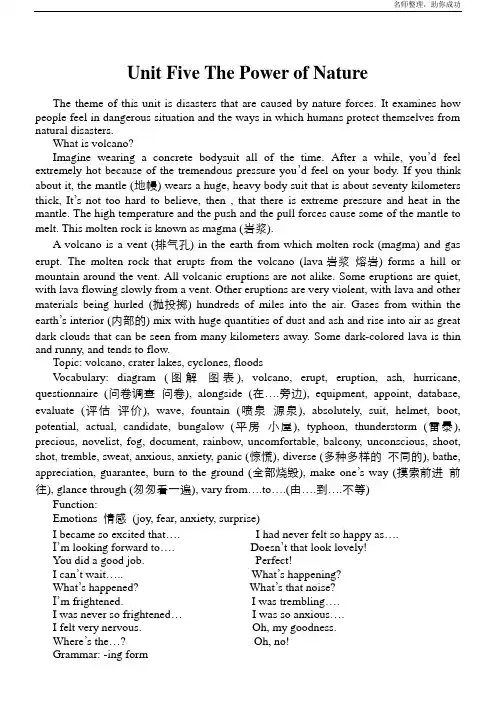
Unit Five The Power of NatureThe theme of this unit is disasters that are caused by nature forces. It examines how people feel in dangerous situation and the ways in which humans protect themselves from natural disasters.What is volcano?Imagine wearing a concrete bodysuit all of the time. After a while, you’d feel extremely hot because of the tremendous pressure you’d feel on your body. If you think about it, the mantle (地幔) wears a huge, heavy body suit that is about seventy kilometers thick, It’s not too hard to believe, then , that there is extreme pressure and heat in the mantle. The high temperature and the push and the pull forces cause some of the mantle to melt. This molten rock is known as magma (岩浆).A volcano is a vent (排气孔) in the earth from which molten rock (magma) and gas erupt. The molten rock that erupts from the volcano (lava岩浆熔岩) forms a hill or mountain around the vent. All volcanic eruptions are not alike. Some eruptions are quiet, with lava flowing slowly from a vent. Other eruptions are very violent, with lava and other materials being hurled (抛投掷) hundreds of miles into the air. Gases from within the earth’s interior (内部的) mix with huge quantities of dust and ash and rise into air as great dark clouds that can be seen from many kilometers away. Some dark-colored lava is thin and runny, and tends to flow.Topic: volcano, crater lakes, cyclones, floodsV ocabulary: diagram (图解图表), volcano, erupt, eruption, ash, hurricane, questionnaire (问卷调查问卷), alongside (在….旁边), equipment, appoint, database, evaluate (评估评价), wave, fountain (喷泉源泉), absolutely, suit, helmet, boot, potential, actual, candidate, bungalow (平房小屋), typhoon, thunderstorm (雷暴), precious, novelist, fog, document, rainbow, uncomfortable, balcony, unconscious, shoot, shot, tremble, sweat, anxious, anxiety, panic (惊慌), diverse (多种多样的不同的), bathe, appreciation, guarantee, burn to the ground (全部烧毁), make one’s way (摸索前进前往), glance through (匆匆看一遍), vary from….to….(由….到….不等)Function:Emotions 情感(joy, fear, anxiety, surprise)I became so excited that…. I had never felt so happy as….I’m looking forward to…. Doesn’t that look lovely!You did a good job. Perfect!I can’t wait….. What’s happening?What’s happened? What’s that noise?I’m frightened. I was trembling….I was never so frightened…I was so anxious….I felt very nervous. Oh, my goodness.Where’s the…? Oh, no!Grammar: -ing formTeaching important and difficult points:Get students to know about disasters that are caused by natural forces.Have students learn some useful new words and expressions about natural disasters and let them learn effective ways to master them.Enable students to express their emotions such as joy, fear, anxiety and surprise.Let students get a better understanding of the grammar item: the –ing form.Develop students’ listening, speaking, reading and writing ability.The first period Warming-up, Pre-reading, Reading and Comprehending Knowledge and skills:1. To know the meanings of the following words and phrases: diagram (图解图表), volcano, erupt, eruption, ash, hurricane, questionnaire (问卷调查问卷), alongside (在….旁边), equipment, appoint, database, evaluate (评估评价), wave, fountain (喷泉源泉), absolutely, suit, helmet, boot, potential, actual, candidate, bungalow (平房小屋), typhoon, thunderstorm (雷暴), precious, novelist, fog, document, rainbow, uncomfortable, balcony, unconscious, shoot, shot, tremble, sweat, anxious, anxiety, panic (惊慌), diverse (多种多样的不同的), bathe, appreciation, guarantee, burn to the ground (全部烧毁), make one’s way (摸索前进前往), glance through (匆匆看一遍), vary from….to….(由….到….不等), make an effort (努力), be covered with / by, hurricane (飓风)2. To learn about some disasters that are caused by natural forces, how people feel in dangerous and the ways in which humans protect themselves from natural disasters.3. To learn how the information is organized.4. To develop the students’ reading ability by skimming and scanning the passage.5. To develop the students’ speaking ability by talking about natural forces.Emotion, attitude and value:1. To stimulate students’ love to nature.2. To develop students’ sense of cooperative learning.Teaching important and difficult points:1. To enable the students to learn about the power of nature and to develop their reading ability.2. To enable the students to talk about natural forces.Step 1 Warming up1. Warming up by looking and talking(Show students some pictures and let them know about the power of nature).Three types of volcanoes: alive volcano, dormant volcano, extinct volcano.2. Warming up by learning something about V olcano.Step 2 Pre-reading1. Can you imagine climbing into a live volcano in order to measure the temperature of the boiling rock inside?2. Encourage students to talk about volcanoes by looking and discussing.Step 3 Reading and comprehending1. Fast-reading:Ask students to skim the passage so as to get the key words and general idea of each paragraph and answer the question:What is the main idea of the text?_____________________________________________________________.2. Read the passage carefully and answer the following questions:1) Why is the volcanologist’s job important?_____________________________________________________________________.2) Why is the lava that flows on Mount Kilauea more dangerous than the actual eruption?_______________________________________________________________.3) Why was it difficult for the writer to walk towards the edge of the crater?____________________________________________________________________.4) What does the writer find impressive about volcanoes even after studying them for many years?___________________________________________________________________.5) What did the author think it was when an eruption occurred?___________________________________________________________________.6) Why did the scientists look like spacemen?____________________________________________________________________.3. Ask students to scan for detailed information and discuss the following question with their partners and be prepared to report to the class.Having learnt a little more about the work of a volcanologist, do you think it is an occupation you would enjoy? (Give some examples)_____________________________________________________________________ ________________________________________________________________________________________________________________________________________________ ________________________________________________________________________ ____________________________________________________________________.Step 4 Language studyDeal with any language problem if any words or sentences students might not understand to help the students to have a better understanding of the text.Step 5 Listening, reading aloud and underliningAsk students to read the passage aloud to the tape and let them pay attention to the pronunciation of each word and the pause within each sentence. Tell them to pick out all the useful expressions or collocations from the passage while reading and copy them to the notebook after class as homework.Step 6 Structure analyzingAfter reading, ask students to discuss the text structure.(This passage is a first-person account of a volcanologist’s experiences. The volcanologist described his exciting job and wrote down his first sight of an eruption. The first paragraph introduces the topic and the theme of the text. The rest of the text presents the information in chronological (编年史的) order. A feature of an account of a volcanologist’s experiences is the abundance of time expressions. The iast sentence of the report functions as a conclusion. In addition, each section begins with a topic sentence.) Step 7 RetellingAsk students to talk about the volcanologist’s experiences in their own words. Give them some key words and expressions. Then let them try to retell the passage.Step 8 Homework1. Learn the useful new words and expressions in this part by heart.2. Try to find more pictures showing natural forces and talk about them.Step 9 Reflection after teachingThe second period: ReadingStep 1 Lead inStep 2 Fast reading:Read the passage An Exciting Job as quickly as you can and try to get the main idea of the passage.What is the main idea of the passage?A.An eruption occurred in Hawaii.B. A volcanologist’s job is exciting.C. A volcanologist’s exciting job and his first sight of an eruption.D. A sight of an eruption is horrible.Step 2 Detailed reading1. Read the first and the second paragraphs and finish the following tasks.1) Why is a volcanologist’s job important?_____________________________________________________________________ _____________.2) The writer doesn’t mind the occasional danger of his job because ________.A. He travels to unusual places and meets interesting people from all over the world.B. He likes the different ways of working.C. He thinks his job the most important.D. He is excited about danger and feels alive.3) As a result of the volcanologist’s job, __________.A. other scientists predict the progress of lava from the volcano.B. many people have been warned to leave their homes.C. the eruption causes less damage.D. the eruption may be prevented from breaking out.2. Read the third and the forth paragraphs and finish the following task.1) What made the writer realize that an eruption occurred?2) What does the writer mean by using “lucky” in the sentence “I was lucky enough to have a much closer look at it”?A. He felt much safer on the top while the other two scientists climbed into the crater.B. It was his first sight of an eruption.C. It was the first time for him to watch the crater.D. Both B and C.3. Read the last paragraph and prepare 1-2 questions to ask your partner about it.Step 4 Searching reading1. Analyze the sentence.Having collected and evaluate the information, I helped other scientists to predict where the lava from the volcano will flow next and how fast.2. Which sentence in the test can be replaced by the following one?The reason why I don’t mind that my job is sometimes dangerous is that danger can be exciting and make me full of energy.3. I am still amazed at their beauty as well as their potential to cause great damage. “Potential” means: A. possibility B. opportunity4. Translate the following sentence into Chinese.Having studied volcanoes now for many years, I am still amazed at their beauty as well as their potential to cause great damage.Step 5 DiscussionHaving learned a little more about the work of a volcanologist, what qualities do you think a volcanologist should have? What quality do you think is the most important? And give your reason. Do you like to be a volcanologist?Step 6 Homework1. For more information about natural forces, you may refer to: http: // baike. Baidu. com.2. Finish the exercises in Discovering useful words and expressions on Page 36.The second period Language studyKnowledge and skills:1. Get the students to learn to use the following important new words and phrases freely: absolutely, make one’s way, alongside, appoint, wave, suit, potential, actual.2. Get students to understand and use the following important and useful sentence patterns:1) Having collected and evaluate the information, I hope other scientists to predict where lava from the volcano will flow next and how fast.2) I was about to go back sleep when suddenly my bedroom became as bright as day.3) The other two climbed down into the crater to collect some lava for later study, but this being ny first experience, I stayed at the top and watched them.Teaching important and difficult points:1. Important new words and expressions: absolutely, make one’s way, alongside, appoint, wave, suit, potential, actual.2. Important and useful sentence patterns:1) be about to do …..when…..2) the –ing form used as the adverbial in a sentence3 Some difficult and long sentences in the text.Step 1 Revision1. Check the homework exercises.2. Ask some students to say something about the power of nature.Step 2 Reading and findingGet students to read through Warming Up, Pre-reading, Reading, Comprehending and Learning about language to underline all the new words and useful expressions or collocations in these parts. Read them aloud and copy them down in the exercise book.Step 3 Practice for useful words and expressions1. Turn to Page 36. Go through the exercises in Discovering useful words and expressions with students and make sure they know what to do.2. Give them several minutes to finish the exercises. They first do them individually, and then discuss and check them with their partners.3. Check the answers with the whole class and explain the problems they meet where necessary.Step 4 Language study1. consider: 考虑, 其后接名词/ 代词/ 动名词或者从句/ 疑问词+ 不定式(to be)consider + it + 形容词/ 名词+ 不定式短语, consider + 宾语从句.We are considering going to Hainan for the Spring Festival.He has never considered how to solve the problem.Do you consider that we can finish the project ahead of time?They considered the plan as reasonable.I consider her to have done wonderfully in the final exam.Micheal is considered (to be) expert in computer science.We consider that the defendant (被告) is not guilty.2. –logy ….学论–ist ….学家volcanology火山学论oceanology海洋学论climatology气象学论3. alongside: 在….旁边, 沿着….的边.The police car pulled up alongside. 那辆警车在旁边停下。
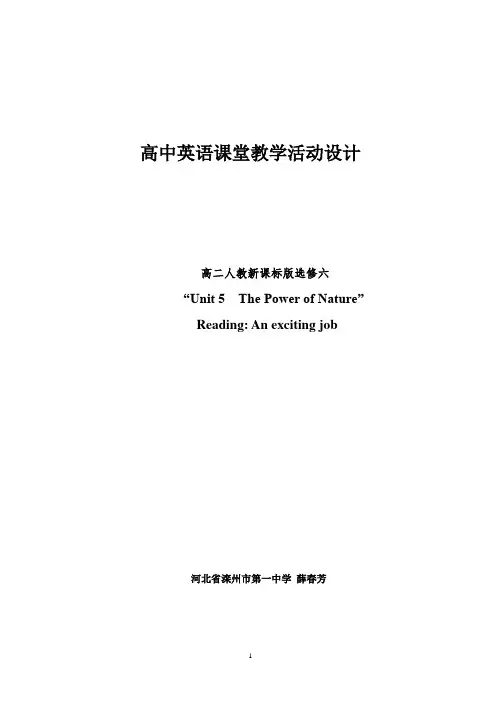
高中英语课堂教学活动设计高二人教新课标版选修六“Unit 5 The Power of Nature”Reading: An exciting job河北省滦州市第一中学薛春芳一、Text Analysis教学内容分析本单元以The power of nature为中心话题,听说读写等语言知识和语言技能主要围绕“自然灾害”及如何预防和利用自然灾害这一主题设计的。
本单元引导学生讨论大自然的危害等问题,目的在于让他们了解大自然的威力,认识到大自然的伟大力量,认识到只有保护大自然,才能有效地预防自然灾害并改造和利用大自然。
并会用所学词汇描述在经历自然灾害时的感受,思考人类应对自然灾害的态度和方法,提高自我保护意识。
Reading部分是一位火山学家的自述。
作者首先介绍了他的工作性质,说明他热爱该项工作的主要原因是能帮助人们免遭火山袭击。
作者的主要工作是收集基拉韦厄火山的资料,并和其他科学家一起分析和预测火山岩浆的流速和方向。
火山爆发不会造成很大的损失,因为山顶附近没有居民。
但是,从山上流下的熔岩会烧毁和埋没周围的城镇。
然而,观看火山爆发是非常令人兴奋的,红色的熔岩喷向高空,高达数百米,甚是壮观。
有一次火山爆发后,作者和另外二位科学家一道来到火山口。
他们身穿白色的防护服,艰难地走近火山口,观察沸腾的火山口中央,并采集了部分岩浆以作研究。
最后,作者表述了他对自己工作的热情。
在从事这项工作20年后,火山对他的吸引力依然不减。
这部分教学内容在整个单元都起着重要的桥梁和纽带作用,不仅是对“热身”部分有效的延伸和扩展,让学生对火山学家有了更深层次的了解,而且对于下节课的写作是个很好的铺垫。
二、教学对象分析高二学生已经对自己的未来取向有了一定的定位,在此基础上阅读一篇火山学家工作的文章,尤其是利用各种现代化教学手段帮助他们进行理解感悟,可以对他们以后的学习或工作有所帮助。
但由于文章生词量的原因,阅读时会影响一定的速度并且在深层理解上会有一定的困难。
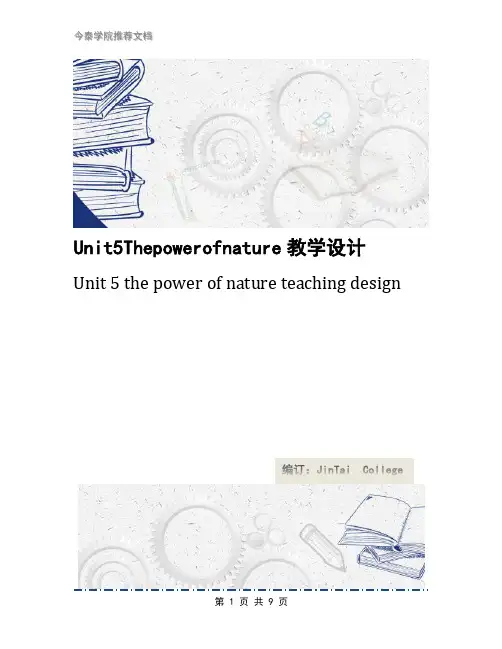
Unit5Thepowerofnature教学设计Unit 5 the power of nature teaching designUnit5Thepowerofnature教学设计前言:小泰温馨提醒,英语作为在许多国际组织或者会议上都是必需语言,几乎所有学校选择英语作为其主要或唯一的外语必修课。
英语教学涉及多种专业理论知识,包括语言学、第二语言习得、词汇学、句法学、文体学、语料库理论、认知心理学等内容。
本教案根据英语课程标准的要求和针对教学对象是高中生群体的特点,将教学诸要素有序安排,确定合适的教学方案的设想和计划、并以启迪发展学生智力为根本目的。
便于学习和使用,本文下载后内容可随意修改调整及打印。
高中英语选修6 unit5 短语、重点句子unit 5 the power of naturei. phrases1.a volcano erupting一次火山爆发2.an active / a live volcano活火山pare…with / to…compare…to…把……和……进行比较把……比作……4.imagine doing sth.设想做某事5.take risks / a riskat riskat the risk of doing sth.…risk doing sth.冒险处于危险之中冒……危险冒险做某事6.meet with sb.碰到、遇到某人7.excite sb./oneself使某人/自己激动8.protect sb. / sth. from…保护……免遭……9.be warned (not) to do sth.warn sb. of danger被警告(不要)去做某事警告某人有危险10.move sth. out of the way 把……搬离……11.burn to the ground全部焚毁12.far more (=much more)多得多,多很多13.the first sight of…第一次看见……14.be fast asleep睡得很熟15.be about to do sth. … when…正要做某事……就在这时……16.as bright as day亮如白昼17.in the distanceat a / some distance在远处(大范围的)(有间隔的)在远处(的具体某地)18.in the side of the mountain在山的一边19.have a much closer look ( at sth.)近距离的观看(某物)20.be in a panicget into a panic陷入恐慌(状态)陷入恐慌(动作)21.make one’s way to …前往…….22.climb down into…爬进……23.be enthusiastic about…对……怀着热情24.be amazed at …对……感到惊讶25.take sb. by surprisetake sth. by surprise使某人大吃一惊突袭26.make an effort to do sth.努力做某事27.be out of work失业28.(the) lake of heaven天上的湖(天池)29.thick forest茂密的森林30.nature reserve自然保护区31.vary from … to …由……到……不等32.a great diversity of多种多样33.take a bath沐浴34.give birth to sb.生小孩35.glance through匆匆看一遍36.be bored with sb. / sth.对某人/某物厌烦37.cancel one’s appointment with sb.取消和某人的约会ii. sentences1.have you ever considered how weak humans are compared with a volcano , hurricane or earthquake?你有没有想过,与火山、飓风和地震比起来,人类是多么软弱?2.having collected and evaluated the information , i help other scientists to predict where lava from the volcano will flow next and how fast it will flow .收集和评估这些信息之后,我就帮助其他科学家一起预测熔岩接着将往何处流,流速是多少。
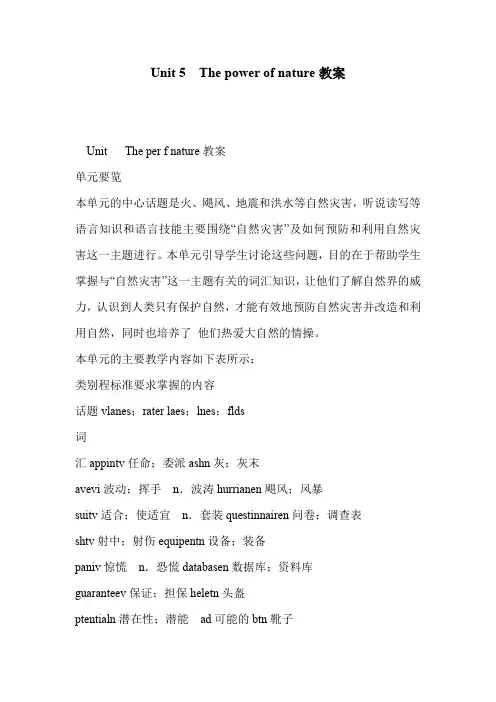
Unit 5The power of nature教案Unit The per f nature教案单元要览本单元的中心话题是火、飓风、地震和洪水等自然灾害,听说读写等语言知识和语言技能主要围绕“自然灾害”及如何预防和利用自然灾害这一主题进行。
本单元引导学生讨论这些问题,目的在于帮助学生掌握与“自然灾害”这一主题有关的词汇知识,让他们了解自然界的威力,认识到人类只有保护自然,才能有效地预防自然灾害并改造和利用自然,同时也培养了他们热爱大自然的情操。
本单元的主要教学内容如下表所示:类别程标准要求掌握的内容话题vlanes;rater laes;lnes;flds词汇appintv任命;委派ashn灰;灰末avevi波动;挥手n.波涛hurrianen飓风;风暴suitv适合;使适宜n.套装questinnairen问卷;调查表shtv射中;射伤equipentn设备;装备paniv惊慌n.恐慌databasen数据库;资料库guaranteev保证;担保heletn头盔ptentialn潜在性;潜能ad可能的btn靴子anxietn担心;焦虑;渴望andidaten候选人;候补者abslutead绝对的;完全的bungaln平房;小屋atualad实在的;实际的tphnn台风anxiusad焦虑的;不安的thunderstrn雷暴alngsideadv在旁边;沿着边prep在……旁边;沿着……的边nvelistn 小说家absluteladv绝对地;完全地fgn雾eruptvi(指火)爆发;突然发生duentn;证evaluatev评估;评价;估计rainbn彩虹funtainv 泉水般地喷出或涌出n.喷泉;泉balnn阳台treblevi摇晃;摇动;颤抖shtn射击;枪炮声seatvi出汗n.汗appreiatinn欣赏;感激;感谢bathevi洗澡;游泳preiusad贵重的;珍贵的diagran图解;图表;示意图unfrtablead不舒服的;不舒适的vlann火unnsiusad失去知觉的;未察觉的eruptinn火爆发;(战争等)爆发diversead 多种多样的;不同的ae ne’s a 前往burn t the grund全部焚毁glane thrugh 匆匆看一遍attaht把……附在……上var frt由……到……不等pareith把……和……做比较a live vlan 一座活火be abut t d 即将;马上;正要做part f 部分run ut f 跑出去;用光;耗尽ut f the a不挡道;不碍事;躲开l dn int向下看be vered ith被……所覆盖,遮掩taeb surprise使……吃惊a great diversit f 多种多样的be he t 是……的栖息地;原产地in the distane 在远处;在远方pi up 拾起;捡起n earth 在地球上;究竟;到底;根本prtet sb/sthagainst/fr sth保护……不受……的伤害句型1Having_lleted_and_evaluated_the_infratin,I help ther sientists t predit here lava fr the vlan ill fl next and h fast(the -ing fr)2I as_abut_t g ba t sleep hen suddenl bedr beae as bright as da(sbbe abut t d sthhen)3The ther t libed dn int the rater t llet se lava fr later stud,but this_being__first_experiene,I staed at the tp and athed the(the -ing fr) 4Having_studied_vlanes_n_fr_an_ears,I a still aazed at their beaut as ell as their ptential t ause great daage(the -ing fr)b is lleting_infratin_fr_a_database_abut_unt_ilauea(the -ing fr)6I as appinted as a vlanlgist ring_fr_the_Haaiian_Vlan_bservatr(HV)_tent_ears_ag(the -ing fr)功能情感:喜悦、恐惧、焦虑、惊奇(Etins:,fear,anxiet,surprise)I beae s exited that I’ ling frard tPerfet! u did a gd bI’ frightened I as treblingI as s anxius I felt ver nervush,gdness h,n!I had never felt s happ as Desn’t that l lvel?I an’t ait I as never s frightenedhat’s happening? hat’s happened?hat’s that nise? here’s the?语法复习-ing形式(Revise the -ing fr)I as appinted as a vlanlgist ring fr the Haaiian Vlan bservatr(HV) tent ears agb is lleting_infratin_fr_a_database_abut_unt_ilaueaHaving_red_hard_all_da,I ent t bed earlHaving_experiened_quite_a_fe_earthquaes_in_Haaii_alread,I didn’t tae uh ntie教学重点1Get students t n abut disasters that are aused b natural fres2.Have students learn se useful ne rds and expressins abut natural disasters and let the learn effetive as t aster the3.Enable students t express their etins suh as ,fear,anxiet and surprise 4.Let students get a better understanding f the graar ite:the -ing fr .Develp students’ listening,speaing,reading and riting abilit教学难点1Enable students t aster the usages f the -ing fr2.Let students learn t rite a letter expressing etins3.Develp students’ integrative sills时安排Perids needed:6Perid 1aring Up,Pre-reading,Reading and prehendingPerid 2Language StudPerid 3Graar—the -ing FrPerid 4Listening and SpeaingPerid Reading and ritingPerid 6Suing Up,Learning Tip and AssessentPerid 1aring Up,Pre-reading,Readingand prehending整体设计教学内容分析This is the first teahing perid f this unitThe entral part f this perid is the reading passage ith the nae f An Exiting b shing the stude nts the per f naturearing Up gives t tpis fr students t disuss,letting students get se re nledgeabut the per f naturePre-reading prvides se questins and a questinnaire t help students fus n the tpi f the reading passage and lead the students t thin abut an persnal experienes f ring utside,suh as things abut libing int a live vlan,ding dangerus r,travelling,taing riss,adventure,studing rs and s n Reading is a first-persn aunt f a vlanlgist’s experienesHe lves his b ver uh beause he an help prtet rdinar peple fr ne f the st perful fres n earthHis b is lleting infratin fr a database abut unt ilauea and helping ther sientists t predit here lava fr the vlan ill fl next and h fastne,he athed an eruptin and then lleted se lava fr later studAfter an ears,he is still enthusiasti abut his bReading ntains a piture that is an abslutel fantasti sightAfter a glane at the title f the text and the headlines ithin it e n that it is an aunt,in hih there are an etin expressinsThen e an understand the tpi f the text and h the infratin is rganizedprehending nsists f three ritten r ral exerises fr the students t d s as t help the students t get a better understanding f the text,that is t sa,t help the teaher t he h uh the students have understd the text三维目标设计nledge and sills1.T n the eanings f the flling ne rds and phrases:diagra(示意图),vlan(火),erupt(爆发),eruptin(火爆发),ash(灰末),hurriane(飓风),questinnaire(调查表),alngside(在旁边;在……旁边),equipent(装备),appint(委派),database(数据库),evaluate(评估),ave(波浪),funtain(泉水般地喷出或涌出;喷泉;泉),abslute(绝对的),abslutel(绝对地),suit(一套外衣),helet(头盔),bt(靴子),ptential(潜在性;潜在的),atual(实在的),burn t the grund(全部焚毁),ae ne’s a(前往).2.T learn abut se disasters that are aused b natural fres,h peple feel in dangerus situatins and the as in hih huans prtet theselves fr natural disasters3.T learn h the infratin is rganized4.T develp the students’ reading abilit b siing and sanning the passage .T develp the students’ speaing abilit b taling abut natural fresPress and ethds1.hile ding aring Up the teaher an lead in the tpi f this unit b shing students se pitures f natural disasters and intrduing se tehnial vabular nerning vlanes t revie and deve lp students’ understanding f hat a vlan isT as students t nsider ther natural disasters and the as huans deal ith the 2.During Pre-reading the teaher an g arund the lassr and dis uss the questins ith several studentsThis disussin shuld be student-entered and aruse students’ interest in ring utsideThe teaher shuld als as the students se questins and tr t let the have a general nledge f vlanes3.hile ding Reading and prehending,the teaher a first as the students t read the text quil t get the general idea f eah paragraphAfter reading the passage arefull,students are enuraged t anser se questins and disuss thetext struture4.T nslidate the ntents f the reading passage,the students shuld be required t retell the vlanlgist’s experienes in their n rds at the end f the lassEtin,attitude and value1.T stiulate students’ lve t nature2.T develp students’ sense f perative learning教学重、难点1.T enable the students t learn abut the per f nature and t develp their reading abilit2.T enable the students t tal abut natural fres教学过程aring up1.aring up b ling and talingSh the flling pitures t the students and let the n abut the per f nature and tal abut theSaple expressins:hat happened in the pitures abve?D u n an ther natural disasters?Please r ith ur partners and ae a list f natural disasters(suh as earthquae,snstr,fld,drught).Have u ever seen a vlan?(Se ne rds:lava erupt/eruptin rater ative/drant/extint vlanes) 2.aring up b reading the passage belSe nledge abut vlanesThere are thusands f vlanes all ver the rldhat aes vlanes?hat happens? The inside f the earth is ver htBeause it is ver,ver ht,the r has elted lie ieIt has bee liquid,lie aterIt is alas biling,lie ater in a ettleIf u have seen a ettle biling,u n that the stea and biling ater tr t get utThe ver ht elted r inside t he earth als tries t get utUsuall it annt beause the utside f the earth is t thi and strngBut in se plaes the utside f the earth is thin and eaSeties a ra(a sall pening)appearsThe ht elted r,hih e all “lava”,pushes up thrugh the ra and bursts thrughStea and gas sht up int the air and the ht elted lava purs utBig piees f r a be thrn high int the airAfter a hile the vlan bees quiet againThe elted lava bees hardLater the sae thing happens again and againEah tie re ht lava purs ut n tp f the ld lava and then bees hardIn this a a ind f untain is built up,ith a hle dn the iddlePerhaps the vlan ill then be quiet and n re lava ill burst utPerhaps it ill start again hundreds f ears laterVesuvius is the nae f a ver faus vlan in ItalIt first ae t life an,an ears agIt as quiet fr hundreds f earsThen in the ear 79 it suddenl burstA great lud f se sht up int the s ith great burning rs,hih fell all arundHt lava pured dn its sidesAbut 3000 peple ere illedPre-reading1an u iagine libing int a live vlan in rder t easure the teperature f the biling r inside?N,read the flling passage pleaseh des Tazieff ris his life lie this?Harun Tazieff,the plish sientist,has spent his lifetie studing ative vlanes and deep aves in all parts f the rldIn 1948,he ent t Lae ivu in the ng t bserve a ne vlan hih he later naed iturTazieff as able t set up his ap ver lsed t the vlanes hile it as erupting vilentlThugh he anaged t tae a nuber f b rilliant phtgraphs,he uld nt sta near the vlanes fr ver lngHe ntied that a river f liquid r as ing tards hiIt threatened t surrund hi pletelBut Tazieff anaged t esape ust in tie,he aited until t he vlanes beae quiet and he as able t return t das laterThis tie,he anaged t lib int the uth f itur s that he uld tae phtgraphs and easure teperaturesTazieff has ften rised his life in this aHe has been able t tell us re abut at ive vlanes than an an alive 2.Enurage students t tal re abut vReading and prehending1.Fast-reading:As students t si the passage s as t get the e rds and general idea f eah paragraph and anser the questin:hat’s the ain idea f the text?2.Read the passage arefull and anser the flling questins(1)h is a vlanlgist’s b iprtant?(2)h is the lava that fls n unt ilauea re dangerus than the atual eruptin?(3)h as it diffiult fr the riter t al tards the edge f the rater?(4)hat des the riter find ipressive abut vlanes even after studing the fr an ears?()hat did the authr thin it as hen an eruptin urred?(6)h did the sientists l lie spaeen?Suggested ansers:1.This passage is a first-persn aunt f a vlanlgist’s experienesThe vlanlgist desribed his exiting b and rte dn his first sight f an eruptin 2.(1)Vlanlgists stud vlanes s that the an arn peple hen the vlan is ging t erupt and s save an lives(2)The lava fls dn the untain and an ver up r burn villages in its pathThe rs that erupt fr the vlan usuall dn’t daage anthing beause n ne lives near the rater(3)The authr as earing speial prtetive lthing that ade it diffiult t al(4)The authr finds their be aut and their ptential t ause great daage ver ipressive()He thught it as an earthquae(6)Beause the re hite prtetive suits that vered their hle bd3.As students t san fr detailed infratin and disuss the flling questin ith their partners and be prepared t reprt t the lassQuestin:Having learned a little re abut the r f a v lanlgist,d u thin it is an upatin u uld en?Give u reasnsSuggested ansers:N,I prbabl uldn’t en this b beause I uldn’t have t live in ther untries and I dn’t lie being in dangerus situatins,eitherAbve all,I’ nt ver gd at sieneRes,I’d lve t d a b lie this beause I uld en ring utside and I thin I uld en the adventureIt uld be exiting t eet peple fr different untries and I uld feel gd abut helping peple avid dangerLanguage studDealing ith an language prble if an(rds r sentenes students ight nt understand)t help the students t have a better understanding f the text Listening,reading alud and underliningAs students t read the passage alud t the tape and let the pa attentin t the prnuniatin f eah rd and the pauses ithin eah senteneTell the t pi ut all the useful expressins r llatins fr the passage hile reading and p the t the nteb after lass as herllatins:ae ne’s a,a live vlan,be abut t d,l dn int,ut f the a,be vered ith,burn t the grund,attaht,pareith,run ut fStruture analzingAfter reading,as students t disuss the text struturees fr referene:This passage is a first-persn aunt f a vlanlgist’s experienesThe vlanlgist desribed his exiting b and rte dn his first sight f an eruptinThe first paragraph intrdues the tpi and the thee f the textThe rest f the text presents the inf ratin in hrnlgial rderA feature f an aunt f a vlanlgist’s experienes is the abundane f tie expressinsThe last sentene f the reprtfuntins as a nlusinIn additin,eah setin begins ith a tpi senteneRetellingAs students t tal abut the vlanlgist’s ex perienes in their n rdsGive the se e rds and expressinsThen let the tr t retell the passageHer1.Learn the useful ne rds and expressins in this part b heart2.Tr t find re pitures shing natural fres and tal abut theRefletin after teahing___________________________________________________________ ________________________________________________________________________ __________Reading:An Exiting bⅠ:Lead-inⅡ:Fast reading:Read the passage An Exiting b as quil as u an and tr t get the ain idea f the passagehat is the ain idea f the passage?A.An eruptin urred in HaaiiB.A vlanlgist’s b is exiting.A vlanlgist’s exiting b and his first sight f an eruptinD.A sight f an eruptin is hrribleⅢ:Detailed reading1.Read the first and the send paragraphs and finish the flling tass①h is a vlanlgist’s b iprtant?___________________________________________________________ _____________②The riter desn’t ind the asinal danger f his b beause______A.he travels t unusual plaes and eets interesting peple fr all ver the rld B.he lies the different as f ring.he thins his b the st iprtantD.he is exited abut danger and feels alive③As a result f the vlanlgist’s b,______A.ther sientists predit the prgress f lava fr the vlanB.an peple have been arned t leave their hes.the eruptin auses less daageD.the eruptin a be prevented fr breaing ut2.Read the third and the furth paragraphs and finish the flling tass①hat ade the riter realize that an eruptin urred?②hat des the riter ean b using “lu” in the sentene “I as lu enugh t have a uh lser l at it”?A.He felt uh safer n the tp hile the ther t sientists libed int the rater B.It as his first sight f an eruptin.It as the first tie fr hi t ath the raterD.Bth B and3.Read the last paragraph and prepare 1-2 questins t as ur partners abut itⅣ:Searhing reading1.Analze the senteneHaving lleted and evaluated the infratin,I helped ther sientists t predit here the lava fr the vlan ill fl next and h fastHaving lleted and evaluated the infratin是______,在句子中作______;predit后是由here和h引导的两个______。
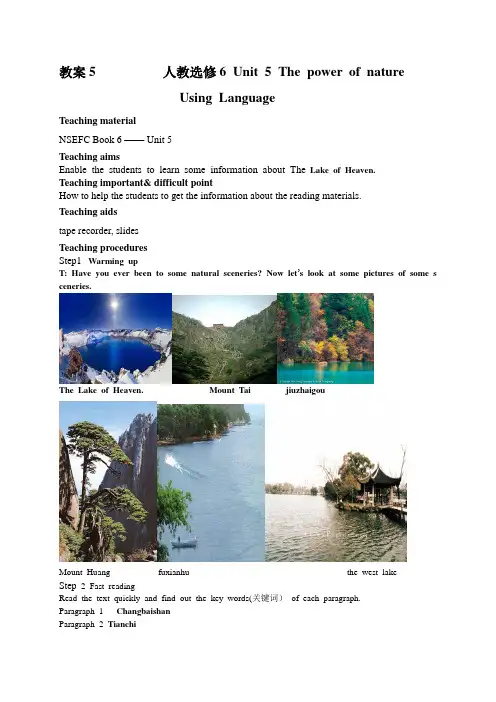
教案5 人教选修6 Unit 5 The power of natureUsing LanguageTeaching materialNSEFC Book 6 —— Unit 5Teaching aimsEnable the students to learn some information about The Lake of Heaven.Teaching important& difficult pointHow to help the students to get the information about the reading materials.Teaching aidstape recorder, slidesTeaching proceduresStep1Warming upT: Have you ever been to some natural sceneries? Now let’s look at some pictures of some s ceneries.The Lake of Heaven. Mount Tai jiuzhaigouMount Huang fuxianhu the west lakeStep2 Fast readingRead the text quickly and find out the key words(关键词)of each paragraph.Paragraph 1 ChangbaishanParagraph 2 TianchiParagraph 3 storiesParagraph 4 coinStep3 Careful ReadingRead the passage carefully and finish the following tasks.Three young women bathingfrom heaven a birdflewThe Manchupeopledroppedfather fruitA handsome gave birth toboy swallowed The youngest girlpregnantParagraph 4 coinYou and your ______ one drop a ____ into the clear, blue water to ________ your love will be as _____ and _______ as the lake.Keys: loved; coin; guarantee; deep; lastingStep4 Detailed reading1. In what province is Changbaishan?In Jilin Province.2.What is a nature reserve? Why is Changbaishan a famous nature reserve?A place kept in its natural state for people to enjoy. The largest one in China.3.What is the most popular tourist attraction in the reserve?Tianchi, or the Lake of Heaven.4. What does Tianchi mean? How is Tianchi formed?The Lake of Heaven. In the crater of a dead volcano.5. What is the connection between the Manchu people and Tianchi?The story of the father of Manchu people.Step5 DiscussionIf you were a tourist guide(导游), how would you introduce the Lake of Heaven in Chang baishan to the tourists?ChangbaishanTianchistorycoinThe Lake of Heavenin its four seasonsSpring summer autumn winterStep6 HomeworkSurf the Internet to find more information about the Lake of Heaven.。
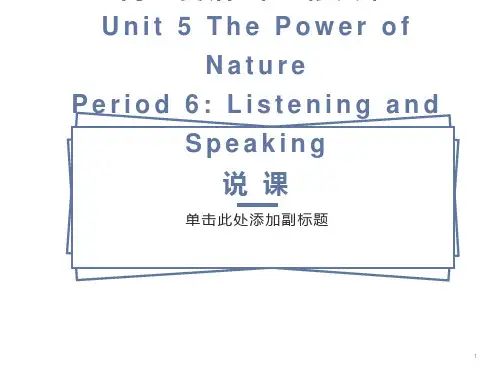
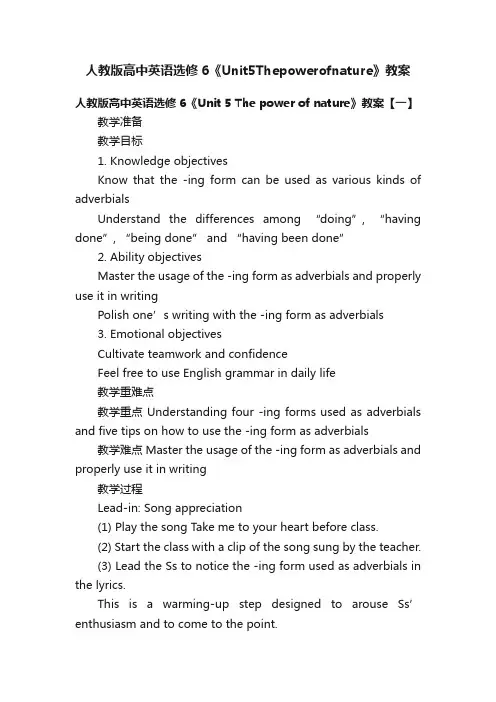
人教版高中英语选修6《Unit5Thepowerofnature》教案人教版高中英语选修6《Unit 5 The power of nature》教案【一】教学准备教学目标1. Knowledge objectivesKnow that the -ing form can be used as various kinds of adverbialsUnderstand the differences among “doing”, “having done”, “being done” and “having been done”2. Ability objectivesMaster the usage of the -ing form as adverbials and properly use it in writingPolish one’s writing with the -ing form as adverbials3. Emotional objectivesCultivate teamwork and confidenceFeel free to use English grammar in daily life教学重难点教学重点 Understanding four -ing forms used as adverbials and five tips on how to use the -ing form as adverbials 教学难点 Master the usage of the -ing form as adverbials and properly use it in writing教学过程Lead-in: Song appreciation(1) Play the song T ake me to your heart before class.(2) Start the class with a clip of the song sung by the teacher.(3) Lead the Ss to notice the -ing form used as adverbials in the lyrics.This is a warming-up step designed to arouse Ss’ enthusiasm and to come to the point.Step 1: We ChooseTask 1: Observe the -ing form in each sentence and decide what it refers to.(reason, result, concession, time, manner, condition)1. Being very rich, he spends as much money as he likes. (reason)2. Working hard, you’ll surely succeed. (condition)3. They sat there, waiting for the beginning of the sports meeting. (manner)4. Walking on the street, he came across a long-lost friend. (time)5. The polar bear was not careful enough, falling on the icy ground. (result)6. Not understanding what you are talking about, I still admire you. (concession)It is intended to remind Ss that the -ing form can be used as various kinds of adverbials. Ask several Ss to answer and, if necessary, interpret the sentences for them with adverbial clauses.Task 2: Check the words in red and decide their relation with the subject and the predicate. (A. active B. passive C. meanwhile D. before-after)Laughing and jumping, he left school.Having finished his homework, he left school.Being talked about at that time, he left school.Having been punished, he left school.First, let Ss choose the correct relation between the -ing form and the subject and that between the -ing form and the predicate in each sentence. Then lead Ss to sum up the differences among “doing”, “having done”, “being done” and “having beendone”.Task 3: Read the sentences aloud and recall the tips.When the reading is finished, ask Ss how to use the -ing form as adverbials.It is intended as a transition from “what” to “how” and the second step is naturally introduced.Step 2: We ChangeTask 1: (Group work) Identify the mistakes in the following sentences and change the sentences into correct ones. Discuss your reason.1. I had a wonderful childhood, travel around the world.2. When crossed the road, you should be careful.3. Having not finished his homework, he was punished by his parents.4. Working hard, your dream will come true.It is aimed to revise the usage of the -ing form as adverbials. By group discussion, Ss may find it easier to solve the problem. Matters such as non-predicate, relation, conjunction, negative words and logical subject are all involved.Task 2: (Pair work) Orally change the adverbial clauses or compound sentences into the -ing form as adverbials.e.g. After we have been informed of Mr. Li’s birthday, we hurried to express our best wishes on the blackboard.(Notice that only the clause part will be changed: predicate→non-predicate)Having been informed of Mr. Li’s birthday, we hurried to……1. Because we hoped to convey our concern for him, we asked Miss Zhu to bring him a card.2. When we danced together, we felt very excited.3. Although we had not met him before, we still treated himas an old friend.4. If you think it over, you will have a good idea.5. She stood on the stage and played with her hair.6. He was so humorous that he made us burst into laughter.It is designed for Ss to put into practice the tips mentioned in the previous task.Step 3: We ChatTask 1: Using the correct form of the given verbs, help me to complete the caption of my moment.Last month, I led my students to join in the oral English competition.(live) far away from the site, we had to get up early in the morning. (not eat) anything before, I felt hungry. As for the students, though tired, they were still enthusiastic about the coming challenge, (talk and laugh) on the bus. When (arrive) at the site, they were very excited.(devote) to practicing before, they did a wonderful job in the competition, (bring) glory to our school. As far as I am concerned, (make) great efforts to practice, any of you can also stand out.It is a revision of the tips mentioned. In addition, it sets an example of how to use the -ing form as adverbials in our daily life.Task 2: Writingo Choose a picture to post.o Write the caption for it.o Try to use the -ing form as adverbials. (3 minutes)Ss are asked to choose a picture from five and write the caption for it by using the -ing form as adverbials in 3 minutes. This is to integrate what has been covered and put it into practice.Task 3: Sharingo Move around the classroom.o Share your moment.o Get “like” or “comment”.(You may also leave your comment when discovering any grammatical mistake.)An example is shown to clarify the instruction. Then Ss are given five minutes to share their moments with their classmates. This is a peer proof-reading activity.Task 4: Presentingo How many“ likes” have you got?o What about “comments”?o Who would like to share with the whole class your moment or the comments you got?This is for several volunteers to present their works and notice the common mistakes when using the -ing form as adverbials.Step 4: SummarySummarize what we have learnt today:o 6 kinds of adverbialso 4 forms of -ingo 5 tipsThis is to remind Ss of what they have learnt today.课后习题Homeworko Review the usage of the –ing form as adverbials.(You may refer to a mini-lecture. )o Polish your caption and share it with your friends.o Finish exercise 3 - 5 on Page 64 of your exercise book.The homework is intended to familiarize Ss with the rules of the -ing form used as adverbials and to develop their writingskills.人教版高中英语选修6《Unit 5 The power of nature》教案【二】教学准备教学目标教学目标:1 深入理解课文,分析文章长难句,培养快速阅读、整体理解和写作的能力。
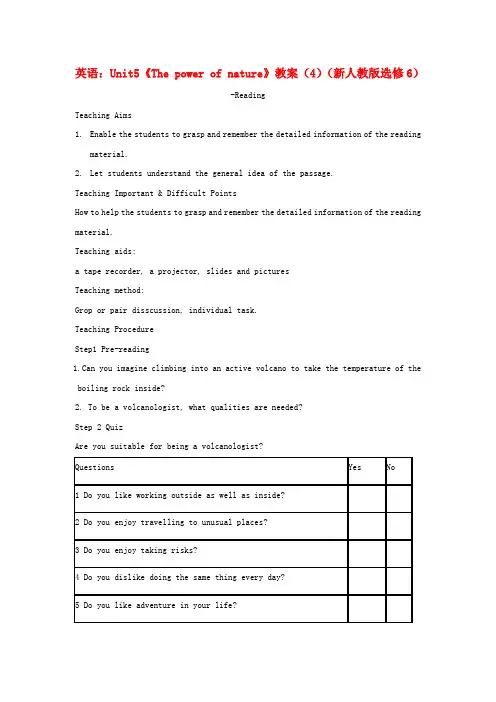
英语:Unit5《The power of nature》教案(4)(新人教版选修6)-ReadingTeaching Aims1.Enable the students to grasp and remember the detailed information of the readingmaterial.2.Let students understand the general idea of the passage.Teaching Important & Difficult PointsHow to help the students to grasp and remember the detailed information of the reading material.Teaching aids:a tape recorder, a projector, slides and picturesTeaching method:Grop or pair disscussion, individual task.Teaching ProcedureStep1 Pre-reading1.Can you imagine climbing into an active volcano to take the temperature of the boiling rock inside?2. To be a volcanologist, what qualities are needed?Step 2 QuizAre you suitable for being a volcanologist?What kind of work do you think a volcanologist do?Step 3 SkimmingSkim the text and answer the following questions.1.What is the writer?He is a volcanologist working for the Hawaiian Volcano Observatory. He mainly collects information about Mount Kilauea.2.When did he first see an eruption? How did it look like?It was in the second week after he arrived in Hawaii. It was very bright although it was night. Red lava fountained hundreds of meters into the air and it was a fantastic sight.3. What was he wearing when getting close to the crater? And what was the result? He was wearing white protective suits that covered his whole body, helmets, big boots and special gloves, just like a spaceman. As a result, it made him difficult to walk. Step 4 ScanningScan the text and answer the following questions.1. Why is a volcanologist’s job important?Volcanologists study volcanoes so that they can warn people when the volcano is going to erupt and so save many lives.2. Why is the lava that flows on Mount Kilauea more dangerous than the actual eruption?The lava flows down the mountain and can cover up or burn villages in its path. The rocks that erupt from the volcano usually don’t damage anything becaus e no one lives near the crater.3. Why did the scientists have to get close to the volcano after it began erupting? The scientists needed to get samples of the lava so they could study them.4. What does the writer find impressive about volcanoes even after studying them for 20 years?The author is impressed by the beauty of the eruption and also by its potential to cause great destruction.Step 5 Detailed readingRead the text more carefully and answer the following questions.1. What made the author realize that an eruption occurred?my bed began shakinga strange soundMy bedroom became as bright as dayan absolutely fantastic sightred hot lava was fountaining hundreds of meters into the air2. What did the scientists do after the eruption?put on white protective suits, helmets, big bootsdropped as closed as possible to the craterslowly make our way to the edge of the craterlooked down into the red boiling centerStep 6 Homework1.Find out words, expressions and sentences which you think are useful, important or difficult to understand.2.Finish exercises in Learning about Language. (Ex. 1, 2)。
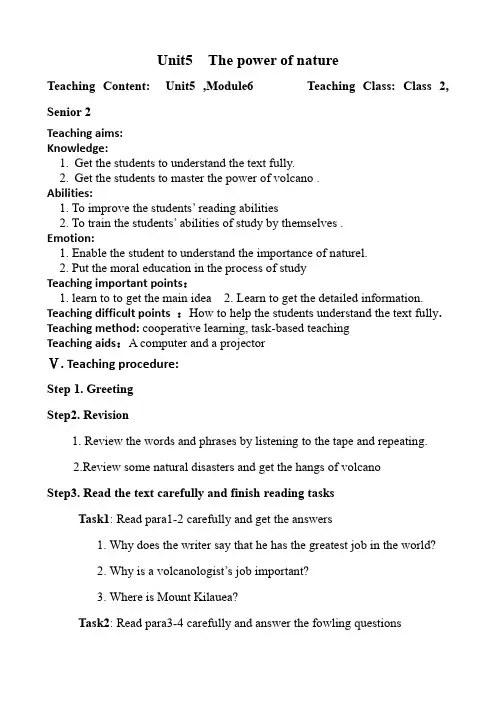
Unit5 The power of natureTeaching Content: Unit5 ,Module6 Teaching Class: Class 2, Senior 2Teaching aims:Knowledge:1.Get the students to understand the text fully.2.Get the students to master the power of volcano .Abilities:1. To improve the students’ reading abilities2. To train the students’ abilities of study by themselves .Emotion:1. Enable the student to understand the importance of naturel.2. Put the moral education in the process of studyTeaching important points:1. learn to to get the main idea2. Learn to get the detailed information. Teaching difficult points :How to help the students understand the text fully. Teaching method: cooperative learning, task-based teachingTeaching aids:A computer and a projectorⅤ. Teaching procedure:Step 1. GreetingStep2. Revision1. Review the words and phrases by listening to the tape and repeating.2.Review some natural disasters and get the hangs of volcanoStep3. Read the text carefully and finish reading tasksTask1: Read para1-2 carefully and get the answers1. Why does the writer say that he has the greatest job in the world?2. Why is a volcanologist’s job important?3. Where is Mount Kilauea?Task2: Read para3-4 carefully and answer the fowling questions4. Why is the lava that flows on Mount Kilauea more dangerous thanthe actual eruption?5. What caused the writer’s bedroom to become as bright as dayeven though it was night?6. Why did the scientists have to get close to the volcano after itbegan erupting?7. Why was it difficult for the writer to walk towards the edge of thecrater?Task3: Read para5 carefully and get the answerWhat does the writer find impressive about volcanoes even afterstudying them for many years?Task4:Get the main idea of the text.Step4.SummaryI have the ________ job in the world. I am never _____ with it. Although it is occasionally dangerous, I don’t mind because danger ______ me and makes me feel ____. I think my job is the most __________ because I can help _______ people from danger of volcanoes.I am a ___________ working for HVO. Our work has ______ many lives but unfortunately we can not save their _______. I have ___________ a volcano eruption in Hawaii. I was ____ asleep when my bed began _______ and I heard a _______ sound, like a _____ passing nearby. Then I found my bedroom was as ______ as day, and red lava was ___________ hundreds of meters into the air. The next day, three of us wanted to get close to the ______.We put on _________ suits, ________, big _______ and special ______, which made us look like __________. We slowly _____________ to the edge of the crater to collect some _____ for __________. After studying volcanoes for many years, I am just as ___________ about my job as before. Why? Because of their ________ and their _________ to cause great damage.Step6.Homework1.Finish the exercise on Page352.Try to retell the text。
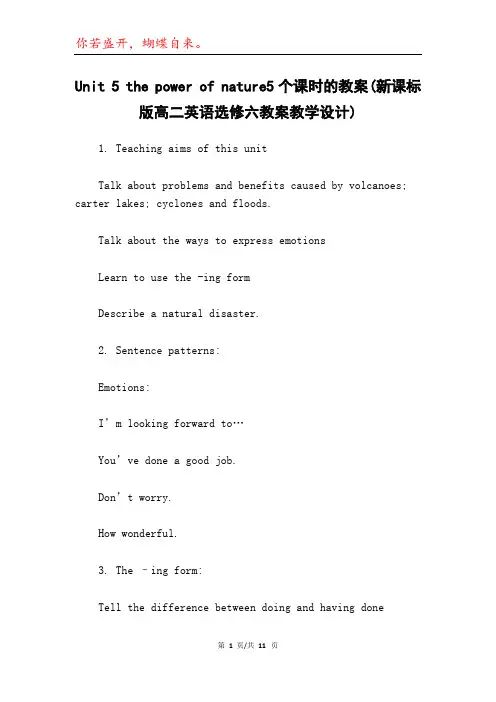
Unit 5 the power of nature5个课时的教案(新课标版高二英语选修六教案教学设计)1. Teaching aims of this unitTalk about problems and benefits caused by volcanoes; carter lakes; cyclones and floods.Talk about the ways to express emotionsLearn to use the -ing formDescribe a natural disaster.2. Sentence patterns:Emotions:I’m looking forward to…You’ve done a good job.Don’t worry.How wonderful.3. The –ing form:Tell the difference between doing and having doneThe first period Warming upStep I Leading in1. Let the students list what they know about the nature disasters.2. Introduce some famous natural disasters.Step ⅡWarming –upAsk the students to talk about the following questions:① Have you ever seen a volcano in the flesh? If you have, share your experiences with your classmates and teachers?② Do you like exploring volcanoes? A re you afraid the dangers you may face?③ Do you know what a volcanologist do and how important his or her job is ?Step Ⅲ Pre- readingDiscuss in groups of four1. Do you like working outside as well as inside?2. Do you enjoy traveling to unusual places?3. Do you like adventure in your life?Step Ⅳ Learning the new words1. Read aloud the new words by themselves.2. Read aloud the new words after the tape.3. Read aloud the new words all together.Step Assignment1. Collect as much information about natural disasters as possible.2. Recite the first 20 new words.The second period ReadingStep ⅠRevision1. Greetings.2. Review the new words of this part.Step II Warming upDo you know any natural disasters ?1. Please work with your partners and make a list of natural disasters which you have known.2. What do you know about volcano?3. Do you know how a volcano erupts?Step III Reading1. Skimming1) What kind of things a volcanologist might do.2) What is the volcanologist wearing when getting close to the crater?2. Scanning1) Why is a volcanologist’s job important?2) Where is Mount Kilauea?3) Why is the lava that flows on Mount Kilauea more dangerous than the actual eruption?4) What caused the writer’s bedroom to become as bright as day even though it was night?5) Why did the scientists have to get close to the volcano after it began erupting?6) Why was it difficult for the writer to walk towards the edge of the crater?7) What does the writer find impressive about volcanoes even after studying them for 20 years?3. Intensive readingFind out the main idea of the passage:Part 1(Pa 1-2) What is the writer’s job and the importance of his job?Part 2(Pa 3-4) The writer’s experience of watching the volcano eruptionPart 3(Pa 5) The reasons why the writer is enthusiastic about his job?4. Creative group discussion:1) Having learnt a little more about the work of a volcanologist, do you think it is an occupation you would enjoy? Discuss your reasons with others in your class.2) If you could meet the writer of the passage, what kind of questions would you ask? Discuss with others in your class.Step Ⅲ Assignment1. Page 35 ~~36 Learning about language2. Page 70 Ex 1The third period Learning about languageStep Ⅰ Greeting and Re vision( Ask some students to retell the text we learned .)StepⅡ. Practicing the useful words and expressions1. Read the new words.2. Check the answers to Learning about language and Page 70 Ex 1. Explain in details if the students have any difficulties.3. Finish all the exercises in Section one of 《中华一题》。
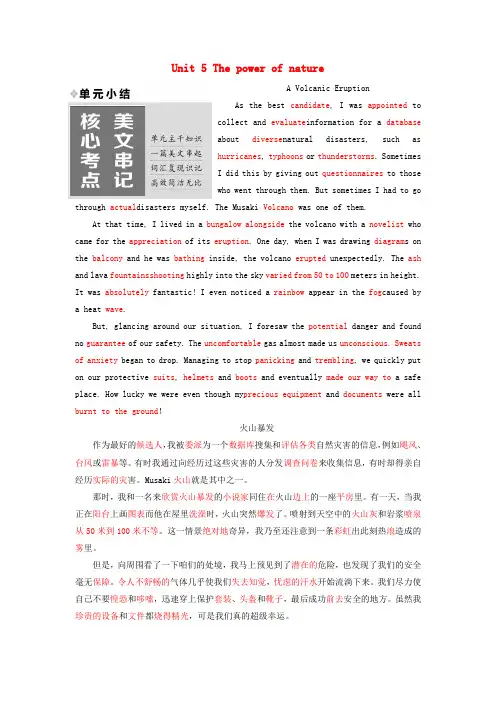
Unit 5 The power of natureA Volcanic EruptionAs the best candidate, I was appointed tocollect and evaluate information for a databaseabout diverse natural disasters, such ashurricanes, typhoons or thunderstorms. SometimesI did this by giving out questionnaires to thosewho went through them. But sometimes I had to go through actual disasters myself. The Musaki Volcano was one of them.At that time, I lived in a bungalow alongside the volcano with a novelist who came for the appreciation of its eruption. One day, when I was drawing diagram s on the balcony and he was bathing inside, the volcano erupted unexpectedly. The ash and lava fountainsshooting highly into the sky varied from 50 to 100meters in height. It was absolutely fantastic! I even noticed a rainbow appear in the fog caused by a heat wave.But, glancing around our situation, I foresaw the potential danger and found no guarantee of our safety. The uncomfortable gas almost made us unconscious. Sweats of anxiety began to drop. Managing to stop panicking and trembling, we quickly put on our protective suits, helmets and boots and eventually made our way to a safe place. How lucky we were even though my precious equipment and documents were all burnt to the ground!火山暴发作为最好的候选人,我被委派为一个数据库搜集和评估各类自然灾害的信息,例如飓风、台风或雷暴等。
2019-2020年高中英语 Unit5《The power of nature》教案(8)新人教
版选修6
I.单元教学目标 (技能目标)
talk about volcanoes and the work of volcanologists
practise expressing fear and anxiety
learn the –ing form used as adverbial in a sentence
write about an experience in a nature disaster
II.目标语言
1.功能句式: expressing fear and anxiety.
I was so excited about what I had done and where I was, I forgot
my fear.
I was very worried that…
I was very relieved when…
I was trembling almost as much as the ground under my feet.
I was still terrified.
I was so nervous that my whole body was damp with sweat.
I was so anxious that I couldn’t move for a long time.
I had to force myself not to panic.
Then I got up the courage to …
2.词汇
四会词汇:volcano erupt eruption ash hurricane adventure bore excite evaluate unfortunate unfortunately fountain absolute absolutely fantastic crater potential impress precious novelist cancel effort relieve tremble sweat anxiety anxious panic courage typhoon heaven diverse diversity unique bathe swallow guarantee
词组:pare …with burn to the ground make an effort make one’s way
glance through vary from … to
3. 语法:the –ing form used as adverbial in a sentence
looking carefully at the ground , I made my way to the edge of the crater.
Having experienced quite a f ew earthquakes in Hawaii already, I didn’t take much notice.
III.教材分析
本单元以the power of nature 为话题,旨在通过本单元教学使学生了解火山爆发,地震,台风,洪水,海啸等自然现象,认识到自然的伟大力量,并会用所学词汇描述在经历自然灾害时的感受,思考人类应对自然灾害的态度和方法,
提高自我保护意识。
Warming up 通过对火山爆发示意图的探讨激活学生了解与本单元话题相关的背景知识,而后通过讨论人类应对自然灾害的措施引发学生对本单元话题的思考,激发学生的求知欲,为随后进行的听说读写打下基础。
Pre-reading 通过回答问题测试自己是否适合作火山学家,让学生了解这一陌生职业,为阅读做好准备。
Reading 部分一味火山学家以第一人称的形式讲述了自己的工作及第一次目睹火山爆发时的情景和心情,描写了人与自然的斗争与和谐相处的乐趣,使学生认识到火山是美丽的,
但同时极具破坏力,而火山学家的工作可以减少由火山引发的损失。
prehending 设计了两种题型:第一题要求学生在阅读后发表对火山学家这一职业的看法;第二题检测学生对文章细节的理解。
Learning about language 分为词汇和语法两部分。
词汇部分着重从词的意义用法和表达方
面对学生学习词汇给予指导;语法部分学习-ing形式在句子中作状语表原因,时间及结果。
Using language 以语言实践为目的,包括四个部分的内容。
Listening 三位火山学家
讲述了他们各自最惊险的一次经历。
学生在练习听力的同时学会描述害怕和紧张的词汇。
Speaking 是listening 的延续。
要求学生讲述自己类似的经历,同时在运用中巩固单词。
Reading 介绍了旅游胜地the lake of heaven,培养学生快速获取信息的能力。
Reading
与writing 属于同一话题,要求根据所给信息写一篇介绍hot springs 的作文。
Sunning up部分要求学生就火山,火山学家,天池,本单元词语,-ing形式和表达情感的日常交际用语等方面进行自我评价,判定呢感学习情况。
learning tip 部分介绍单词记忆方法:利用构词法或话题分类记忆单词;利用图表,图片等记忆单词;随身携带生词本;多说多写。
32756 7FF4 翴431331 7A63 穣)30970 78FA 磺M37221 9165 酥729184 7200 爀f27759 6C6F 汯26058 65CA 旊q39453 9A1D 騝x。